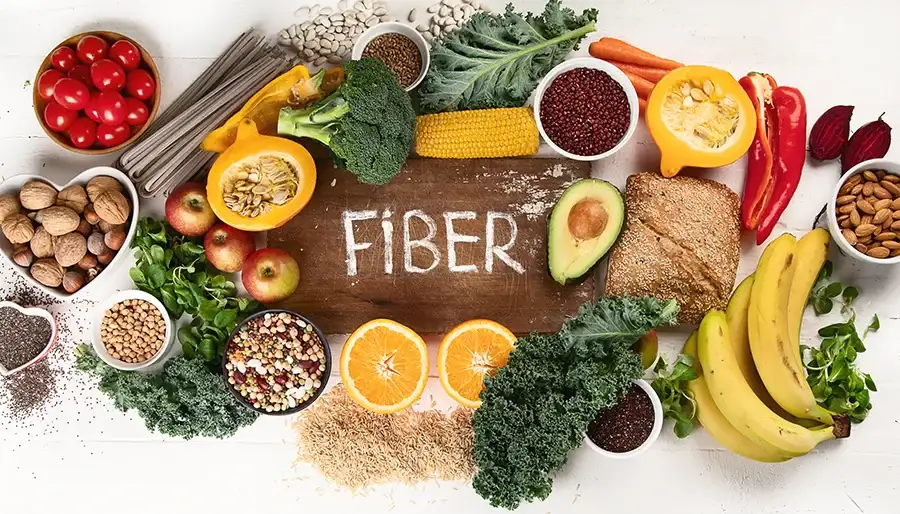
"Good food; Good mood" is a common phrase that we come across many times in our lives. They say to eat healthy to stay healthy. But do we know what it means and what does good food consist of?
Good food consists of a balanced diet, consisting of a healthy mix of essential nutrients such as protein, carbohydrates, fat, water, vitamins and fibre. While all nutrients play an important role in keeping us healthy, one of the nutrients that play a special role in our body’s healthy functioning is fibre.
Before moving on to learning more about the various
health benefits of fibre, let us understand what is fibre.
Key Highlights
- It is essential to eat a balanced diet for healthy living and fibre is an essential part of the diet.
- There are two types of dietary fibres - soluble and insoluble.
- A fibre-rich diet helps reduce cholesterol, eliminates constipation, maintains blood glucose levels, and increases longevity.
- Fibre consumption should be kept in check and you should drink sufficient water to stay hydrated.
What is Fibre?
Dietary fibre, also commonly known as roughage or bulk, is made up of plant foods, which a human body cannot digest or absorb. In simple words, it is that part of your food that cannot be broken down into sugar.
Fibres are classified into soluble (which dissolve in water) and insoluble (which do not dissolve in water) fibres.
Also Read -
Does your food plate need an analysis? Find out.
Health Benefits of Fibre
A
high-fibre diet benefits the human body in more ways than one. Some of the main
health benefits of fibre rich diet are as follows:
Reduced Cholesterol Levels
Certain soluble fibres such as beans, oats, flaxseed and oat bran help you lower the total blood cholesterol in your body by lowering the low-density lipoprotein, also known as “bad” cholesterol levels.
Aids Weight Loss
Foods rich in fibre such as fruits and vegetables are known as calorie foods, which are usually more filling than those foods that are low in fibre. This helps you stay full for a long time. Thus, you tend to eat less, and subsequently, lose weight.
Prevents Constipation
Dietary fibres absorb water from your stool, add bulk to it, increase the weight and size of your stool, and soften it helping you pass stool easily without feeling constipated all the time.
Helps Maintain Healthy Blood Sugar Level
Fibres especially soluble fibre slow down the sugar absorption process, thereby improving the overall blood sugar level in your body. Insoluble fibre helps you reduce the risk of developing type-2 diabetes.
Lowers Risk of Cancer
Some fruits like apples contain pectin which has certain antioxidant properties that help prevent cancers including colon cancer.
Increased Longevity
Dietary fibres, especially cereal fibres, help you live longer as they are associated with a reduced risk of acquiring cardiovascular disease and other diseases.
Promotes Healthy Lungs
Fibres reduce inflammation, improve gut bacteria diversity, enhance respiratory function and lower the risk of developing COPD.
Benefits in Pregnancy
As per recent studies, a
high-fibre diet benefits pregnant women by reducing the risk of asthma in their children within the initial years of their life.
Points to Remember Before Indulging in a Fibre-Rich Food
While fibre is an essential nutrient, here are a few facts that you should keep in mind -
- Drink plenty of water to avoid bloating and gas issues.
- Maintain a properly balanced diet inclusive of all the right nutrients in the right quantity.
- Excessive intake of fibre-rich diet food might lead to dehydration and constipation.
Balancing Fibre in Your Diet
A balanced diet with a healthy mix of nutrients is what makes a human body fit and active. The main
health benefits of a
fibre-rich diet are not limited to one’s physical health; it also positively impacts the mind. To get more information about
health insurance please visit reliance general insurance website.
Intake of a proper fibre-rich diet relieves you of constipation issues, aids in weight loss, lowers the risk of developing major diseases and helps you stay light and relaxed. This can lead to your overall mental and physical well-being.
FAQs
Q1 - What are the major health benefits of fibre fibre-rich diet?
The major
health benefits of fibre rich diet are:
- Low risk of developing cardiovascular diseases as well as cancer.
- Helps you stay full for long
- Increased longevity
- Maintains cholesterol as well as blood sugar levels in the body
- Aids in weight loss
- Prevents constipation
Q2 - How does a high-fibre diet benefit young children?
High fibre diet benefits young children by helping them avoid several immunity-related disorders, irritable bowel syndrome (IBS), and constipation, thereby making them feel light, active, and energised.
Q3 - How can I enjoy the various health benefits of fibre?
You can enjoy the various
health benefits of fibre by striking a balance between the intake of all the essential nutrients and fibre in the required quantity. Too little or too much fibre might hurt your body. Secondly, it is also very important to drink an adequate amount of water to avoid feeling gaseous or bloated.
Q4 - What minimum dosage is prescribed to enjoy the various health benefits of fibre?
The prescribed minimum dosage needed to enjoy the various
health benefits of fibre is roughly between 20 gms and 28 gms/per day for an adult. But this again depends upon the age, sex, and daily calorie intake of the individual and may vary from person to person.
Q5 - Which food items offer maximum high-fibre diet benefits?
Some of the food items offering maximum
high-fibre diet benefits are:
- Oats
- Nuts
- Fruits
- Brown rice
- Beans
- Almonds
- Legumes